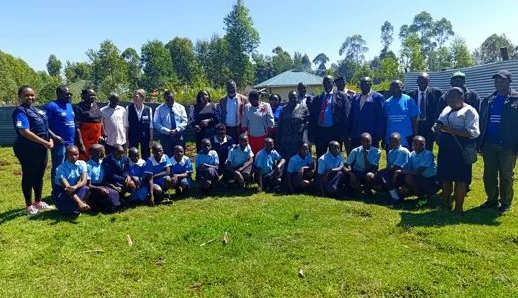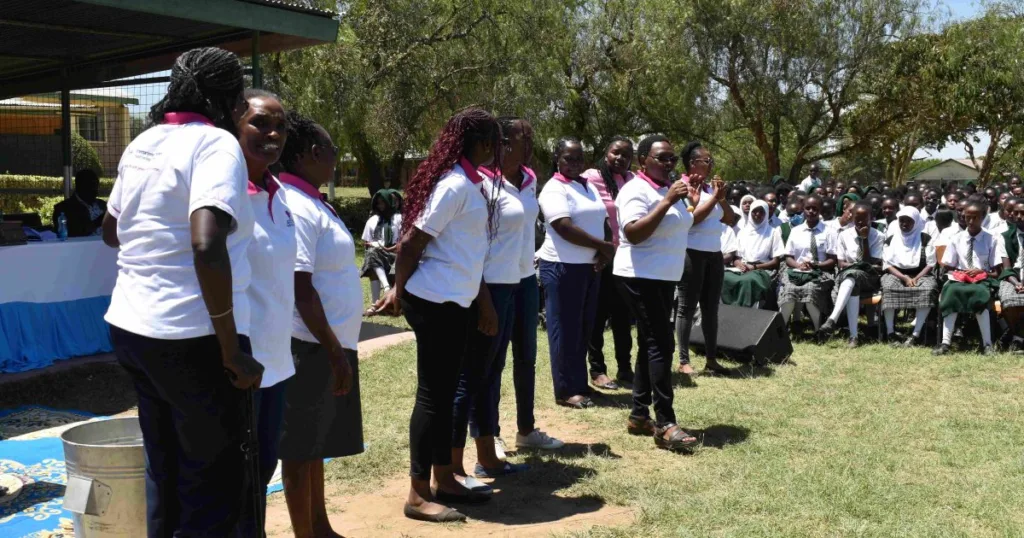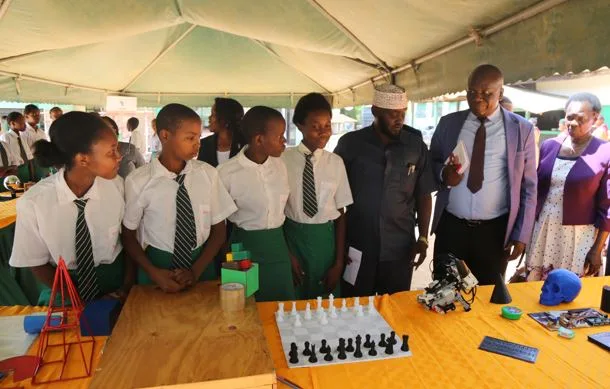Girls Urged to Embrace Science and Math for Lucrative Careers.
Girls have been urged to develop an interest in science and mathematics subjects early in their secondary education to secure lucrative career opportunities in the future.
Academicians have expressed concern over national exam statistics, which indicate that Kenyan girls generally do not perform as well as boys in Science, Technology, Engineering, and Mathematics (STEM) subjects.
This issue was highlighted during the International Day of Women and Girls in Science celebration, held at Mulango Girls High School in Kitui County. The event, themed “Unpacking STEM Careers: Her Voice is Science,” was attended by prominent educationists who emphasized the need for girls to take up STEM subjects.
Challenges and Opportunities in STEM
Prof. Hellen Njeri Njenga, the chief guest at the event, represented the Centre for Mathematics, Science, and Technology Education in Africa (CEMASTEA).
She encouraged girls to not only pursue science and mathematics but also to cultivate a genuine interest in these fields to enhance their career prospects. She emphasized that mastering these subjects would open doors to vast job opportunities in various economic sectors both locally and internationally.
“Science is about solving problems and is applied in our day to day needs for discovery of a better life as well as in community development, while everything is mathematics in solving problems applied daily in human life” the Prof. Said.
A distinguished chemist, Prof. Hellen acknowledged the significant contributions of women in community development. She stressed that by embracing science and mathematics, girls could apply their knowledge to improve their communities.
She pointed out that science plays a crucial role in problem-solving and community advancement, while mathematics is integral to everyday decision-making.
Prof. Hellen also noted the impact of science and mathematics on technological advancements, particularly in Information and Communication Technology (ICT) and industrial production. She highlighted how developed nations have leveraged these disciplines for innovation and economic growth.
Government Commitment to STEM Education
Mr. Nelson Sifuna, head of the directorate of field coordination and co-curricular activities at the Ministry of Education, reiterated that science and mathematics shape students’ future careers regardless of their educational level.
He challenged Kenyan girls to dispel the misconception that STEM subjects are only suited for boys.
Sifuna further emphasized the Ministry of Education’s commitment to developing an education system that nurtures talent across various academic disciplines. He clarified that the ministry aims to support students not only in STEM but also in other fields, such as languages, which are essential for communication skills.
Mrs. Beatrice Macharia, coordinator of special programs and student learning at CEMASTEA, highlighted ongoing initiatives aimed at improving STEM competencies.
She explained that mentorship and outreach programs have been conducted in selected schools nationwide. Additionally, the organization has been actively training teachers in STEM subjects and implementing various science and mathematics enhancement programs across the country.

Nyamira County also commemorated the 10th International Day of Women and Girls in Science at St. Clare Gekendo Girls Secondary School, emphasizing the importance of encouraging young women to pursue Science, Technology, Engineering, and Mathematics (STEM) in both education and careers.
Barriers to Education for Girls in Rural Areas
Representing the chief guest, Principal Secretary for the State Department for Basic Education, Dr. Belio Kipsang’, education officer Mr. Dickon Ogonya from the Nyanza region highlighted that learners from rural and urban slum areas frequently experience irregular school attendance, with girls being the most affected.
This inconsistency often limits their access to quality education and hinders their focus on science subjects.
Several challenges contribute to this issue, including teenage pregnancies, child labor, and cultural practices such as child marriages and involvement in disco matangas.
Mr. Ogonya pointed out that these factors significantly interfere with girls’ education, sometimes leading to complete school dropouts. He encouraged students to believe in their abilities, asserting that success in science is attainable with the right mindset and dedication, just as in humanities.
UNESCO’s Eastern Africa Regional Director, Louise Haxthausen, emphasized that the journey toward scientific careers begins in early education.
She urged society to motivate girls to explore the vast opportunities available in science to empower them and shape a better future. She noted the necessity of female role models in science to mentor and inspire young girls to overcome barriers and pursue STEM careers.
Haxthausen also stressed that fewer women in science results in fewer medical advancements, scientific innovations, and sustainable solutions. In an era of global challenges like climate change, health crises, and artificial intelligence, she insisted that the world requires more scientific contributions from women.
She encouraged girls to challenge systemic obstacles such as limited funding, fewer publishing opportunities, and underrepresentation in senior scientific roles to increase female participation in global scientific advancements.
Local Efforts to Promote STEM Among Girls
St. Clare Gekendo Girls’ School Principal, Ms. Pamela Orori, expressed gratitude to the Ministry of Education and UNESCO for choosing her school as the venue for this crucial event. She acknowledged the positive impact of mentoring young girls, particularly in rural areas, to help them recognize and seize the opportunities available in STEM fields.
Dr. Mercy Motanya, Chief Officer for Sports, Gender, Culture, and Social Services in Nyamira County, highlighted that the county government is committed to supporting education through full scholarships and bursaries.
Read Also: JSS Teachers and KUPPET to Celebrate Valentine’s in a Special Way
She revealed that 51% of the scholarships issued by Governor Nyaribo go to girls, ensuring that they receive necessary financial support to pursue their academic goals. She encouraged them to excel in STEM subjects, as these careers remain largely untapped.
The United Nations General Assembly established the International Day of Women and Girls in Science in 2015 to promote gender equality in scientific fields.
The 2024 theme, ‘Unpacking STEM Careers: Her Voice in Science,’ was nationally commemorated at St. Clare Gekendo Girls Secondary School in Nyamira County, underscoring the need to amplify women’s contributions in STEM disciplines and foster an inclusive scientific community.
Addressing Gender Disparities in STEM

And in Nairobi, a team of female scientists from the University of Nairobi marked the International Day of Women and Girls in Science at Ole Tipis Girls Secondary School in Narok County.
Dr. Esther Kanduma, a senior lecturer in Biochemistry, led the group and emphasized that the day serves as an opportunity to acknowledge and celebrate women’s contributions to science and technology.
She explained that the theme for the year focused on exploring careers in Science, Technology, Engineering, and Mathematics (STEM) while amplifying women’s voices in scientific fields.
Dr. Kanduma pointed out that women represent only 30 percent of the workforce in science-related fields, underscoring the need to support initiatives that encourage gender balance in STEM careers.
She noted that many schoolgirls perceive themselves as weak in science, which made such outreach programs crucial for motivating young students. The mentorship program, she explained, was designed to inspire girls and increase awareness about career prospects in STEM.
Ole Tipis Girls’ principal, Lady Ololokula, attributed the mentorship initiative to the school’s remarkable improvement in science subjects. She highlighted that the school’s mean score had increased from 7.1 to 7.5 points, reflecting a significant rise in national exam performance.
She further stated that in the previous year’s Kenya Certificate of Secondary Education (KCSE) results, 10 girls had attained an A-minus grade, many of whom had participated in the mentorship program.
Additionally, she pointed out that the initiative had contributed to a higher number of students securing admission to public universities. As the Competency-Based Curriculum (CBC) gains momentum, she noted that the school remains among the few in the county to offer STEM programs.
“In last year’s KCSE results, 10 girls scored grade A-minus, many of whom were part of this mentorship program. This initiative has also contributed to more students joining public universities,” added Ololokula.
Read Also: Experts Warn of a Math Learning Crisis, Call for Urgent Reforms in STEM Education in Kenya
Encouraging a Future in Science
Professor Esther Maina, a Biochemist at the University of Nairobi and a member of the school’s Board of Management, acknowledged that Ole Tipis Girls was the first institution to benefit from the mentorship program, which commenced in 2019.
She encouraged parents and other stakeholders to support STEM careers to inspire the next generation of scientists. She emphasized that the future revolves around science and technology, reinforcing the need to prepare young girls for STEM-related professions.
Girls Urged to Embrace Science and Math for Lucrative Careers


Discussion about this post